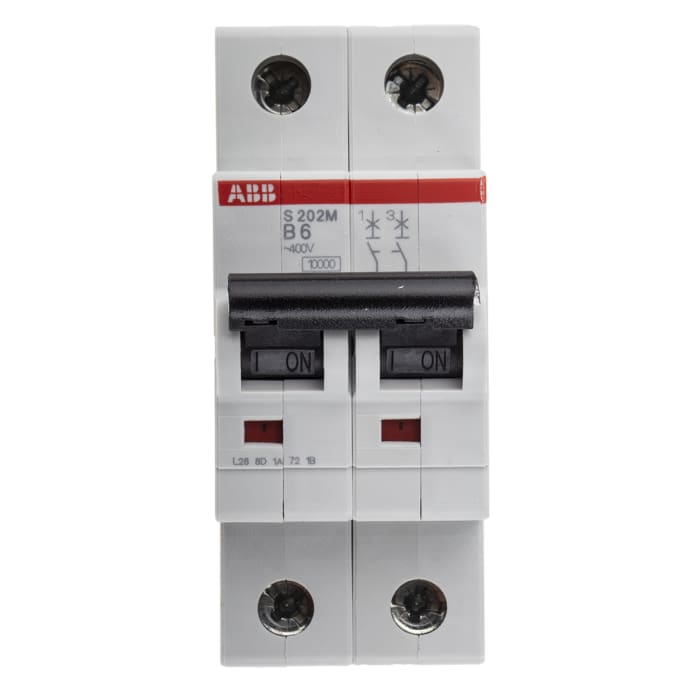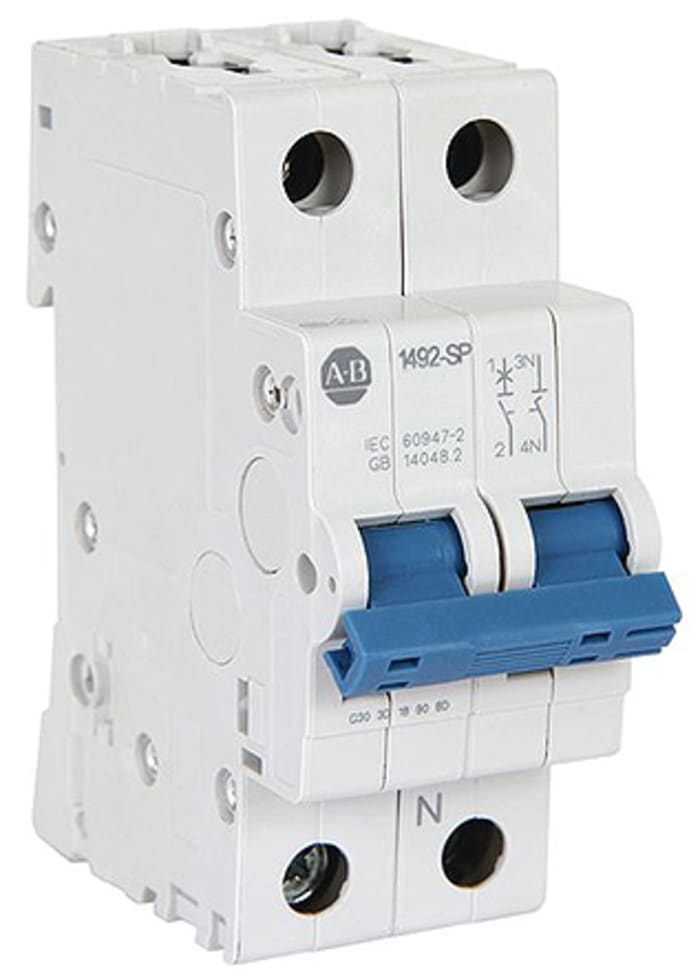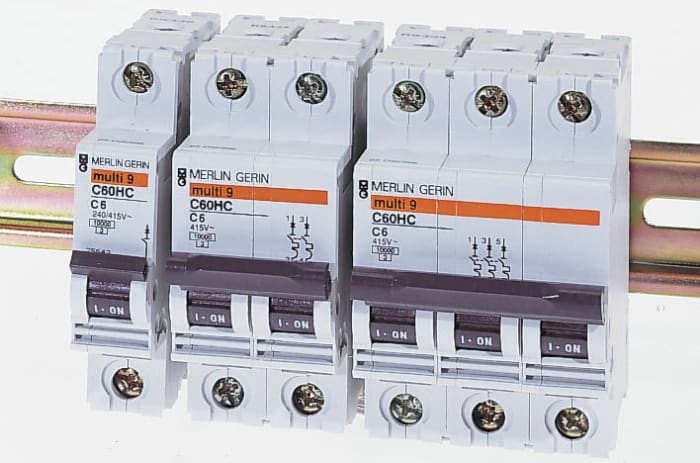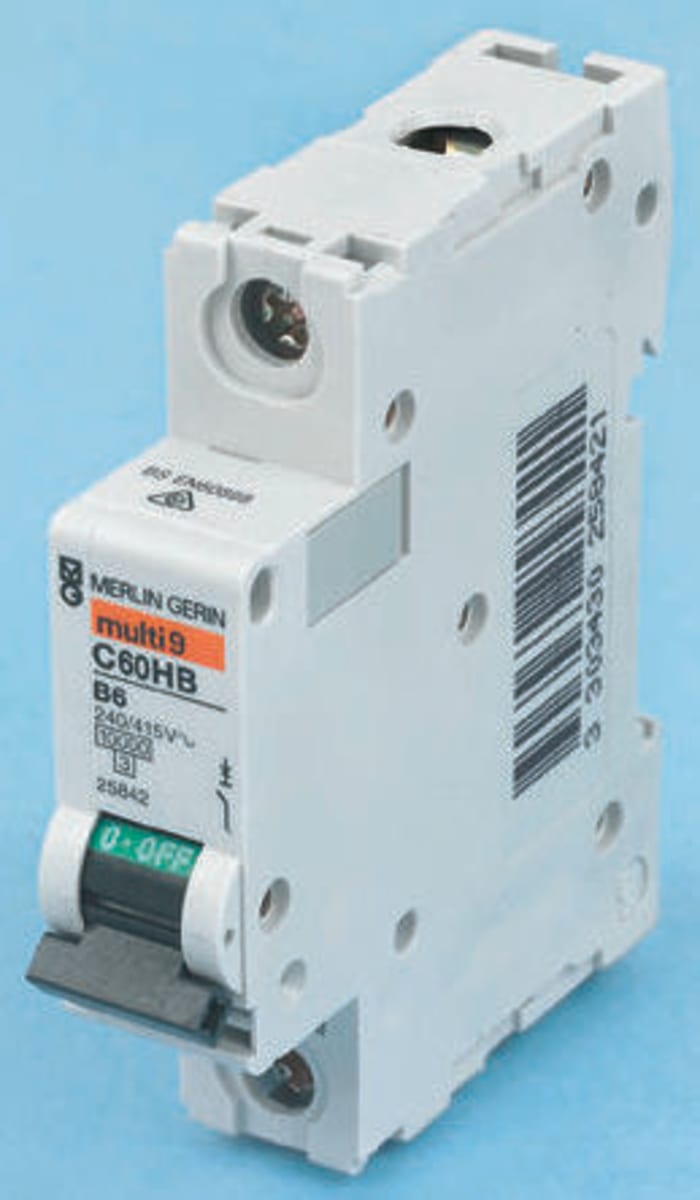Schneider Electric Acti 9 iC60H MCB Mini Circuit Breaker, 2P, 6A Curve B, 12 → 133 V, 220 → 240 V, 380

Technical Document
Specifications
Brand
Schneider ElectricNumber of Poles
2
Current Rating
6A
Tripping Characteristics
Type B
Rated AC Voltage
12 → 133 V, 220 → 240 V, 380 → 415 V, 440 V
Rated DC Voltage
100 → 133V
Breaking Capacity at Maximum Voltage Rating
10 kA
Range
Acti 9
Series
iC60H
Circuit Breaker Type
MCB
Width
36mm
Length
85mm
Mounting Style
DIN Rail Mount
Depth
78.5mm
Better World Product (Find out more)
Yes
Better World Verification
Green Premium
Reset Actuator Type
Rocker Switch
Tripping Mechanism
Thermal-Magnetic
Terminal Contact Type
Screw
Country of Origin
Bulgaria
Product details
Schneider Electric Acti9 iC60H MCBs - 2 Pole
iC60H series multi-standard circuit breakers combine circuit protection against short circuit currents and circuit protection against overload currents it also protects people against indirect contact with TN and IT neutral systems. Fully compliant with standards IEC/EN 60898 and IEC/EN 60947-2. ACTi 9 is fully tested, approved and certified by national and international third parties. It guarantees that your installation is safe and compliant with all relevant safety standards which demonstrates to your customers that you use industry-approved materials and best practices. These MCBs are normally used for high inductive loads where switching surges are high. Providing essential protection in industrial and commercial buildings, these miniature circuit breakers work especially well in polluted environments and networks.
VisiSafe guarantees the downstream circuit is always safe regardless of overvoltage conditions, even in the most demanding environments; the green strip indicates the safe position of contacts.
VisiTrip red window on the front face indicates fault tripping allowing fast diagnosis, resolution, and reclosing loads for easier building management and reduced downtime
Features & Benefits
- Downstream circuit is always safe
- Class-2 insulation: ensures continuous protection for both operators and unqualified persons.
- Insulated terminals (IP20)
- Highly durable with robust connections that provide twice the standard tightening torque
- Provide greater continuity of service thanks to VisiTrip
- Double clip for dismounting with comb busbar in place
Standards
- IEC 60898 - Relates to Low Voltage Circuit Breakers for use in household and similar
- Installations. In the UK traditionally known as miniature circuit breakers
- (MCB’s).
- IEC 60947-2 Relates to Low Voltage Circuit Breakers for use in industrial and similar Installations. In the UK traditionally known as moulded case circuit breakers
- (MCCB’s) and also air circuit breakers (ACB’s).
Q: What exactly does a miniature circuit breaker do?
It protects wires from overloads and short-circuits. For overload protection the temperature of a bimetal, through which the current passes is decisive. If the nominal current—the current the circuit breaker is designed for—rises slightly, the bimetal heats up to a greater extent and, after a certain period of time, this causes the switching mechanism to trip. Today MCBs are installed in all our homes, offices and other buildings, protecting the electrical wires from damage. They have the advantage that they can be manually reset without having to replace wire as in the case of the traditional fuse. The MCBs have either a button or lever that can be flicked to reset it. They are used instead of fuses due to their convenience and improved safety features.
Q: What is the differences in the Tripping Curves B, C, and D?
Curve B: Tripping: 3 to 5 times the rated current.
Applications: protection of generators, persons, very long cables
Curve C: Tripping: 5 to 10 times the rated current
Applications: protection of circuits and general applications
Curve D: Tripping: 10 to 14 times the rated current
Applications: protection of high surge circuits, welders, transformers and motors




EGP 8,347.92
EGP 8,347.92 Each (ex VAT)
1
EGP 8,347.92
EGP 8,347.92 Each (ex VAT)
1
Stock information temporarily unavailable.
Please check again later.




Technical Document
Specifications
Brand
Schneider ElectricNumber of Poles
2
Current Rating
6A
Tripping Characteristics
Type B
Rated AC Voltage
12 → 133 V, 220 → 240 V, 380 → 415 V, 440 V
Rated DC Voltage
100 → 133V
Breaking Capacity at Maximum Voltage Rating
10 kA
Range
Acti 9
Series
iC60H
Circuit Breaker Type
MCB
Width
36mm
Length
85mm
Mounting Style
DIN Rail Mount
Depth
78.5mm
Better World Product (Find out more)
Yes
Better World Verification
Green Premium
Reset Actuator Type
Rocker Switch
Tripping Mechanism
Thermal-Magnetic
Terminal Contact Type
Screw
Country of Origin
Bulgaria
Product details
Schneider Electric Acti9 iC60H MCBs - 2 Pole
iC60H series multi-standard circuit breakers combine circuit protection against short circuit currents and circuit protection against overload currents it also protects people against indirect contact with TN and IT neutral systems. Fully compliant with standards IEC/EN 60898 and IEC/EN 60947-2. ACTi 9 is fully tested, approved and certified by national and international third parties. It guarantees that your installation is safe and compliant with all relevant safety standards which demonstrates to your customers that you use industry-approved materials and best practices. These MCBs are normally used for high inductive loads where switching surges are high. Providing essential protection in industrial and commercial buildings, these miniature circuit breakers work especially well in polluted environments and networks.
VisiSafe guarantees the downstream circuit is always safe regardless of overvoltage conditions, even in the most demanding environments; the green strip indicates the safe position of contacts.
VisiTrip red window on the front face indicates fault tripping allowing fast diagnosis, resolution, and reclosing loads for easier building management and reduced downtime
Features & Benefits
- Downstream circuit is always safe
- Class-2 insulation: ensures continuous protection for both operators and unqualified persons.
- Insulated terminals (IP20)
- Highly durable with robust connections that provide twice the standard tightening torque
- Provide greater continuity of service thanks to VisiTrip
- Double clip for dismounting with comb busbar in place
Standards
- IEC 60898 - Relates to Low Voltage Circuit Breakers for use in household and similar
- Installations. In the UK traditionally known as miniature circuit breakers
- (MCB’s).
- IEC 60947-2 Relates to Low Voltage Circuit Breakers for use in industrial and similar Installations. In the UK traditionally known as moulded case circuit breakers
- (MCCB’s) and also air circuit breakers (ACB’s).
Q: What exactly does a miniature circuit breaker do?
It protects wires from overloads and short-circuits. For overload protection the temperature of a bimetal, through which the current passes is decisive. If the nominal current—the current the circuit breaker is designed for—rises slightly, the bimetal heats up to a greater extent and, after a certain period of time, this causes the switching mechanism to trip. Today MCBs are installed in all our homes, offices and other buildings, protecting the electrical wires from damage. They have the advantage that they can be manually reset without having to replace wire as in the case of the traditional fuse. The MCBs have either a button or lever that can be flicked to reset it. They are used instead of fuses due to their convenience and improved safety features.
Q: What is the differences in the Tripping Curves B, C, and D?
Curve B: Tripping: 3 to 5 times the rated current.
Applications: protection of generators, persons, very long cables
Curve C: Tripping: 5 to 10 times the rated current
Applications: protection of circuits and general applications
Curve D: Tripping: 10 to 14 times the rated current
Applications: protection of high surge circuits, welders, transformers and motors



